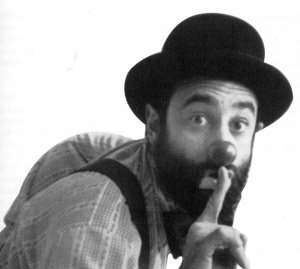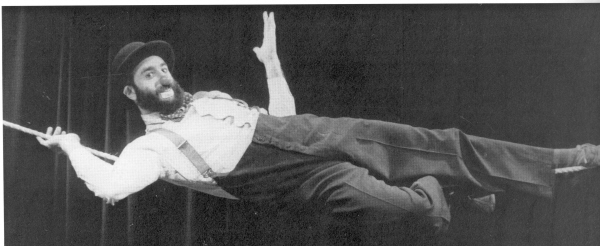 |
 |
Page 24 Summer, 1994
|
Avner the Eccentric Reveals the Final Technique By Karl Saliter
"By
admonishing latecomers at the beginning of the show and taking their
picture, I'm planting a hypnotic suggestion which says, 'you may be
watching a play, but we're watching you, and you are part of the
dialogue now. If you do something, it's going to be part of the
performance. You thought you could just come and sit and be the
Broadway audience. No. You're the audience, and you've got work to
do.''' Avner
The Eccentric, as quoted in Acrobats of the Soul. Avner
Eisenburg operates in his show on a level of awareness high enough to
look down on kites. His empathy for audience members makes them
respond to him, and they love his work. This summer in Burlington,
Avner will attend the IJA festival and juggle in the Cascade of Stars
show. He plans to teach a workshop on working with audience volunteers
and "controlling the space around us while we are onstage."
Participants will benefit not only from the master clown's stores of
knowledge, but from extensive teaching experience as well. For years,
Avner and his wife, Julie Goell, have taught at the Celebration Barn
Theatre in Maine.
The
man the New York Times called "hilarious" and New York
Magazine called "a thinking man's clown," has more rave
reviews than whiskers - and a big year planned for 1994. With a
month-long run at the Syracuse Stage, Japan's FISM
I
first saw Avner in Key West at the original Buskerfest in 1986. My
partner, Mark Farneth, and I left the theatre in awe. I remember Mark
mentioning that perhaps a year or two studying at the Delle' Arte
School would be a good thing. We were honored on Sunday when Avner
walked on Mark's rope in the park, and we came to see that the smile
so quick to grace his face on stage was no script. In the Town Crier
Cafe, a little nightclub owned by Avner's friend Phil Ciganer where
Magical Mystical Michael himself regularly performs, I caught up with
Avner again. Here's what he had to say.
JW:
What makes you angry? AE:
Public administration in any form. Parents who let their kids watch
too much TV. We don't have a TV. Our family and three others nearby do
not own TVs, and I think
we are kinder and gentler as a result.
JW:
Do you have a "message?" AE:
If I do, it's a minimalist message. All the props are everyday
objects, which allows the possibility of lots of drama. My character
is reachable to audience members. I think it's more fun to watch a
fallible person. I would rather see Ratso Rizzo or Woody Allen than
Arnold Schwarznegger anytime. It's boring to watch a perfect person,
and I think many
The
sense of discovery is often killed in most jugglers' approach to
props. The emphasis here is on character development and on
weaknesses. The character has to be a little dumber than the audience.
JW:
Are you? AE:
Is my character?! Yes. When I do the kickup with the bat and it
lands perfectly, I am as surprised as they are. The kickup is
rediscovered by the foot each show out of an emergency. That
look of surprise at the perfectly kicked bat is typical of a mindset
and a presence Avner employs through the show. Like an old master
fingering frets on a favored mandolin, Avner plays his face. The show
is not the show; Avner's reactions and interaction with the show give
silent commentary riddled with insight and lavished with intelligence.
He is on the stage, yet he sits in your seat. Therein lies the show.
He walks on stage and brings the audience into the palm of his hand.
From open to close, he never says a word. The only sound is laughter.
OK, so he plays a kazoo for a while...
He
once brought a napkin doll so resoundingly to life that, when he
pretended that it died, a small boy in the audience "On no!"
In response, Avner resuscitated the napkin. He eats a pancake stack of
paper napkins, turns nested paper cups into a snake, his hand does a
miniature high wire act on an imaginary rope, and he balances many
things, including a 10-foot ladder on his chin. |
 |
 |